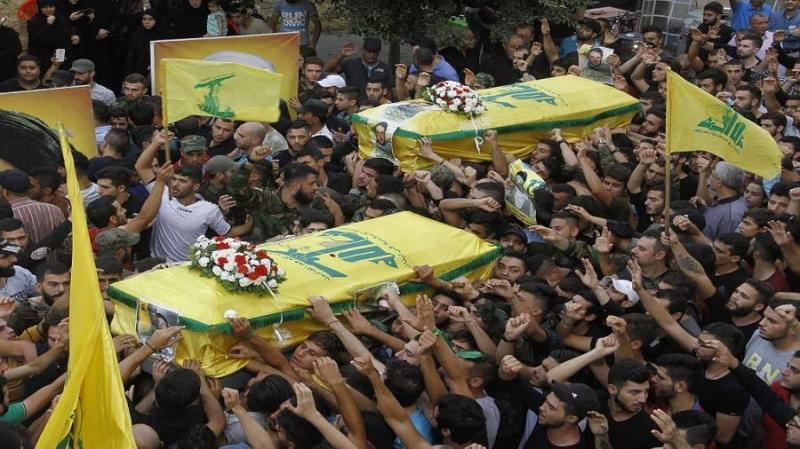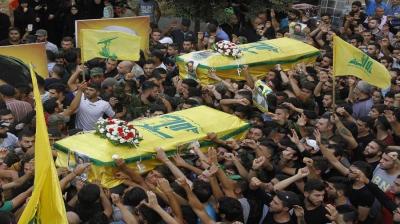The assassination of prominent Hezbollah military leader Taleb Abdullah by Israel in a nighttime airstrike in southern Lebanon has raised questions about the deep intelligence exposure that the group is experiencing amid a significant increase in Israeli targeting since the ongoing Gaza War, which has lasted for about nine months. Experts from Lebanon and Syria who spoke to "Sky News Arabia" agree that the success of Israeli assassinations is a "result of Hezbollah's intelligence exposure to Tel Aviv's extensive reconnaissance capabilities, whether through advanced monitoring devices, drones, or local informants."
One of the main reasons for the continued infiltration is attributed to the Syrian front, stemming from "years of Hezbollah's semi-organized presence in combat within Syria, which has brought many of its leaders and elements under operational monitoring and made their plans and movements vulnerable to Israeli surveillance," according to a Syrian military expert.
**A New Exposure**
On Wednesday, the Israeli army confirmed that it killed Taleb Abdullah, a senior Hezbollah leader, along with three other militants from the group in an airstrike on a command and control center in southeastern Lebanon. In response to Abdullah's death, Hezbollah launched dozens of rockets towards northern Israel, marking a significant escalation in the conflict, which has seen nearly daily exchanges of fire since the war in Gaza began last October, resulting in the deaths of at least 300 of its members.
During Abdullah's funeral in the southern suburbs of Beirut, Hezbollah's Executive Council Head, Hashem Safieddine, promised on Wednesday to increase operations against Israel "both in quantity and quality."
On June 4, the Israeli army announced in a statement the role of the "Field Intelligence Unit 869" of Division 91, noting that it is responsible for gathering multi-dimensional intelligence in the Lebanese border area, identifying Hezbollah elements, and ultimately accomplishing its mission of neutralizing terrorist threats. It revealed that "since the beginning of the war, the unit has identified over 100 terrorists, and through accurate, high-quality intelligence, they have been eliminated in collaboration with ground forces, the Israeli Air Force, and artillery."
Among the prominent Hezbollah leaders killed due to Israeli operations are Ismail Youssef Baz, commander of the coastal sector of Hezbollah, Wissam Al-Tawil, Mohammad Shahouri, Ali Hussein, Ali Al-Dibs, Abbas Raad, commander of the Radwan force, Ali Abd Al-Hassan Naeem, deputy commander of the missile and artillery unit in Hezbollah, Mohammad Aloulia, commander of the Maroun Al-Ras area, Hassan Salami, a leader in Unit Nasser, and Ali Berji, commander of the South Lebanon area. This is in addition to the assassination of Saleh Al-Arouuri, a leader in Hamas, during a meeting in the southern suburbs of Beirut earlier this year.
**The Open Front**
Syrian strategic military expert Abdullah Al-Asad told "Sky News Arabia" that Hezbollah's presence in Syria and its insistence on maintaining that front open for many years has made its leaders, elements, plans, and movements exposed to Israeli intelligence capabilities, thus remaining a potential target under the operational spotlight. He believes that "what happened to Taleb Abdullah and others is part of a target bank held by the Israeli entity, with information and coordinates collected, especially with Hezbollah's presence on the Syrian front."
He suspects that "Israeli targeting could be one of the reasons for infiltration by local informants," asserting that "Hezbollah's security measures appear ineffective against Israeli surveillance methods and advanced organizations that operate without concealment, allowing them to periodically eliminate leaders from a clearly defined and precise target bank."
**Intelligence Superiority**
Lebanese strategic and military expert, retired Brigadier General Hisham Jaber, does not believe that the Syrian front is linked to the series of assassinations of Hezbollah leaders. However, he reaffirms that "Israel's continued targeting of Hezbollah leaders is due to its superiority in this matter, as it has significant intelligence about them, especially given that Lebanon is known to be security-exposed."
This superiority is attributed to the support of Western satellites for Tel Aviv, local informants spread across Lebanese territory, reconnaissance aircraft, and other intelligence maneuvers, adds retired General Hisham Jaber, who heads the Middle East Studies Center in Beirut. He confirms the existence of an intelligence war primarily between Hezbollah and Israel, with the latter having the upper hand for the previous reasons.
He downplays the impact of these targeted killings in light of the ongoing war in Gaza for nine months, stating: "When 10 or 15 leaders, not from the first rank, perhaps one of them is from the first rank falls, it is a militarily natural occurrence." He noted that "estimates indicate the deaths of 350 Hezbollah members, which does not exceed 1 percent of a total force estimated at 35,000 fighters, hence these are not significant losses, while the Israeli side suffers losses from Hezbollah operations and does not disclose its casualties."
According to the Lebanese military expert, Hezbollah avoids these strikes through various internal moves related to reducing the movements of its elements and leadership, dismissing the idea that these operations could reach high-ranking leaders or escalate the conflict between Hezbollah and Israel into a comprehensive or regional war.
**Drones and Technology**
Meanwhile, Lebanese political analyst Tarek Abu Zeinab observes that "the leaders and elements targeted for assassination are located in border areas and move between the front and southern Lebanese villages, making them easy to track by Israel." He pointed out that Israel "uses advanced drones and technology equipped with artificial intelligence," avoiding clarification on how Israel knows the whereabouts of the assassinated party leaders, stating: "No one in Lebanon knows how Israel managed to gather information about the defeated leaders."
He believes that Israel "began implementing assassination policies against Hezbollah leaders after the United States pressured Israel to prevent a large-scale military operation in southern Lebanon." He sees that the Israeli army "essentially relies on airpower, drones, to pursue Hezbollah leaders and has targeted them in areas ranging from 10 to 30 kilometers from the southern border with Israel." He noted that "drones have been able to reach the southern suburbs of Beirut for months and assassinate Hamas leader Saleh Al-Arouuri."




